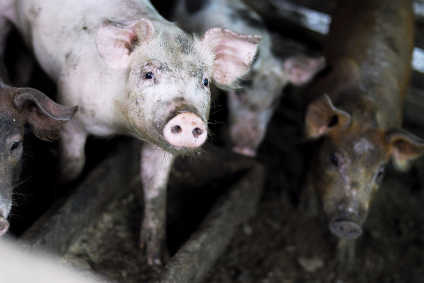
The World Health Organization (WHO) is calling on farmers and the food industry to stop using antibiotics routinely to promote growth and prevent disease in healthy animals.
The WHO said the aim of the new recommendations is to “help preserve the effectiveness of antibiotics that are important for human medicine by reducing their unnecessary use in animals”.

Discover B2B Marketing That Performs
Combine business intelligence and editorial excellence to reach engaged professionals across 36 leading media platforms.
However, the announcement was met with criticism in some parts of the meat industry, with the US pork sector saying it would be “ill-advised and wrong” to “ban [the] disease prevention uses of antibiotics in food-animal production”.
The WHO said the over-use and misuse of antibiotics in animals and humans is contributing to the rising threat of antibiotic resistance. Some types of bacteria that cause serious infections in humans have already developed resistance to most or all of the available treatments, and there are very few promising options in the research pipeline, it said.
It said in some countries approximately 80% of total consumption of medically important antibiotics is in the animal sector, largely for growth promotion in healthy animals.
Dr Tedros Adhanom Ghebreyesus, director-general of WHO, said: “A lack of effective antibiotics is as serious a security threat as a sudden and deadly disease outbreak. Strong, sustained action across all sectors is vital if we are to turn back the tide of antimicrobial resistance and keep the world safe.”

US Tariffs are shifting - will you react or anticipate?
Don’t let policy changes catch you off guard. Stay proactive with real-time data and expert analysis.
By GlobalDataA systematic review published on Tuesday (7 November) in The Lancet Planetary Health claima interventions that restrict antibiotic use in food-producing animals reduced antibiotic-resistant bacteria in these animals by up to 39%. The research directly informed the development of WHO’s new guidelines.
The WHO recommends antibiotics used in animals should be selected from those it has listed as being “least important” to human health, and not from those classified as “highest priority critically important”.
A number of countries have already taken action to reduce the use of antibiotics in food-producing animals. For example, since 2006, the European Union has banned the use of antibiotics for growth promotion.
Alternative options to using antibiotics for disease prevention in animals include improving hygiene, better use of vaccination, and changes in animal housing and husbandry practices.
Some industry bodies and processors have sought to limit the use of antibiotics. In July, a new dairy group was established to help the UK farming, meat processing and veterinary sectors achieve new government targets for antibiotic use on farms.
The move followed the introduction by the UK government in September 2016 of an average national dosage target for antibiotics used on animals.
However, The National Pork Producers Council, the lobby body for the US pork sector, said although the industry has a “goal to reduce the need for antibiotics”, the WHO’s call could endanger animals.
“Denying pigs, cows and chickens necessary antibiotics would be unethical and immoral, leading to animal suffering and possibly death, and could compromise the nation’s food system,” the NPPC said in a statement.
“America’s pork farmers share the WHO’s concern about the rise in antibiotic-resistant bacteria, which is why they have taken steps over the past 30 years to ensure they’re using antibiotics strategically and responsibly to keep animals healthy and to produce safe food. They are complying with an FDA directive that prohibits the use of antibiotics important to human medicine for promoting animal growth and that requires feed and water uses of those same antibiotics to be under a veterinary prescription. They also participate in pork industry-developed programs that include responsible antibiotics use and support federal efforts to track antibiotic resistance in foodborne bacteria from humans, retail meats and food animals.”
The statement continued: “Prevention uses of antibiotics involve administering antimicrobial drugs to animals that aren’t exhibiting clinical signs of disease but that likely will get disease if a drug isn’t administered. Veterinary involvement in the decision-making process associated with the use of medically important antimicrobial drugs not only is an important aspect of ensuring appropriate use, but for feed and water uses it’s the law.”
In the UK, the country’s National Pig Association said the use of antibiotics for preventative reasons was needed.
“While we agree that use of antibiotics routinely for disease prevention should not occur as a substitute for good farm management and hygiene, preventative use is justified in certain circumstances and should be allowed under precise and defined conditions, with veterinary oversight,” Dr Georgina Crayford, the senior policy adviser at the association, told just-food.





